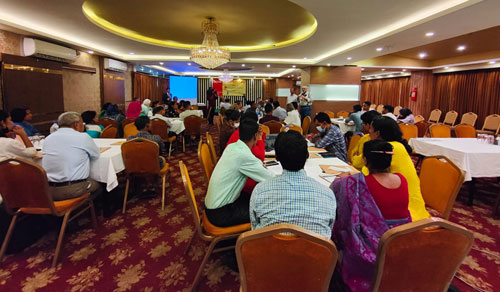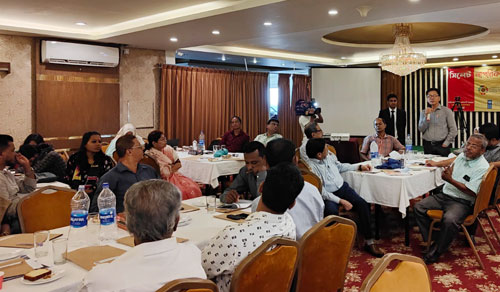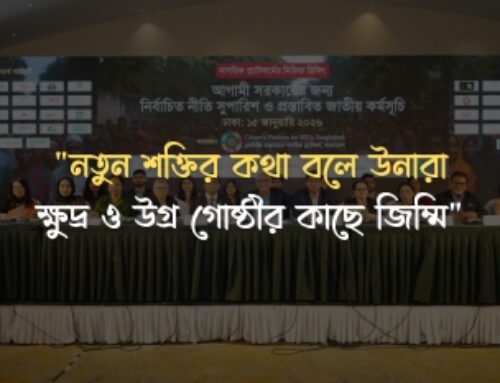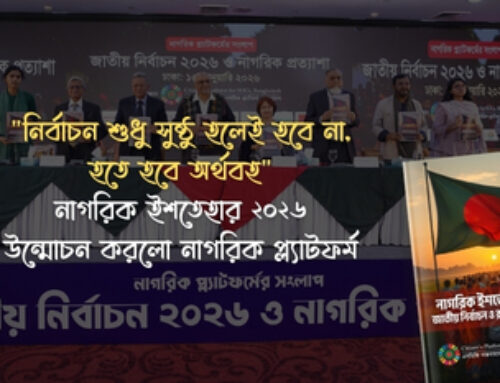Citizen’s Platform for SDGs, Bangladesh, organised a consultation meeting in Sylhet on Saturday, 13 August 2022. This is the fourth in a series of discussions, preceded by meetings in Rangpur, Khulna, and Tangail. The subsequent two consultations will be in Thakurgaon and Chittagong.
 Interacting with district stakeholder representatives and learning more about their opinions on various topics relating to national development were the main goals of the Sylhet consultation. The main objective of the discussion was to gain a better understanding of the level of equality in the distribution of Sylhet’s development triumphs as well as the accessibility of public resources to those living there who have been “pushed behind” or “left behind.” The discussion was attended by 65 people in all, including tea garden workers and representatives from a variety of underprivileged areas.
Interacting with district stakeholder representatives and learning more about their opinions on various topics relating to national development were the main goals of the Sylhet consultation. The main objective of the discussion was to gain a better understanding of the level of equality in the distribution of Sylhet’s development triumphs as well as the accessibility of public resources to those living there who have been “pushed behind” or “left behind.” The discussion was attended by 65 people in all, including tea garden workers and representatives from a variety of underprivileged areas.
The conditions of the lives and livelihoods of tea garden workers were one of the most urgent concerns of the Sylhet consultation, which covered a wide range of issues. It was also mentioned that the prevailing inflation has made it difficult for the workers to afford their families’ basic nutritional needs, medical needs and children’s education expenses.
 The unavailability of freshwater and hygiene amenities in the tea gardens was also brought up in the discussions, which raised concerns about the misery of female workers. Participants identified a unifying theme among the topics brought forward. Owners and other local influential mentioned that workers who have fought for their rights have been at danger financially and socially. When contacted by higher government authorities, tea leaders have frequently been forced to speak about the workers’ “excellent conditions” or have had their plans disrupted by other considerations. It was also revealed that citizens of Sylhet are not supportive of the worker’s rights as the workers are socially excluded because of their race and status.
The unavailability of freshwater and hygiene amenities in the tea gardens was also brought up in the discussions, which raised concerns about the misery of female workers. Participants identified a unifying theme among the topics brought forward. Owners and other local influential mentioned that workers who have fought for their rights have been at danger financially and socially. When contacted by higher government authorities, tea leaders have frequently been forced to speak about the workers’ “excellent conditions” or have had their plans disrupted by other considerations. It was also revealed that citizens of Sylhet are not supportive of the worker’s rights as the workers are socially excluded because of their race and status.
 The discussion also highlighted student’s participation in civic activities such as their involvement in the Road Safety Movement. But the perceived lack of results and repercussions they had to face, stops them from participating more actively. However, the students claimed that positive change is possible through identifying and upholding the values which they feel are integral to progressive change.
The discussion also highlighted student’s participation in civic activities such as their involvement in the Road Safety Movement. But the perceived lack of results and repercussions they had to face, stops them from participating more actively. However, the students claimed that positive change is possible through identifying and upholding the values which they feel are integral to progressive change.
A focus group discussion (FGD) with flood-affected people was held separately. The consultation in particular sought to exhibit the location-specific issues of the greater Sylhet district.
Dr Debapriya Bhattacharya, Convener of the Citizen’s Platform for SDGs, Bangladesh, and Professor Mustafizur Rahman, Core Group Member, Citizen’s Platform for SDGs, Bangladesh led the consultation session. They also had meetings with prominent members of the local media.




